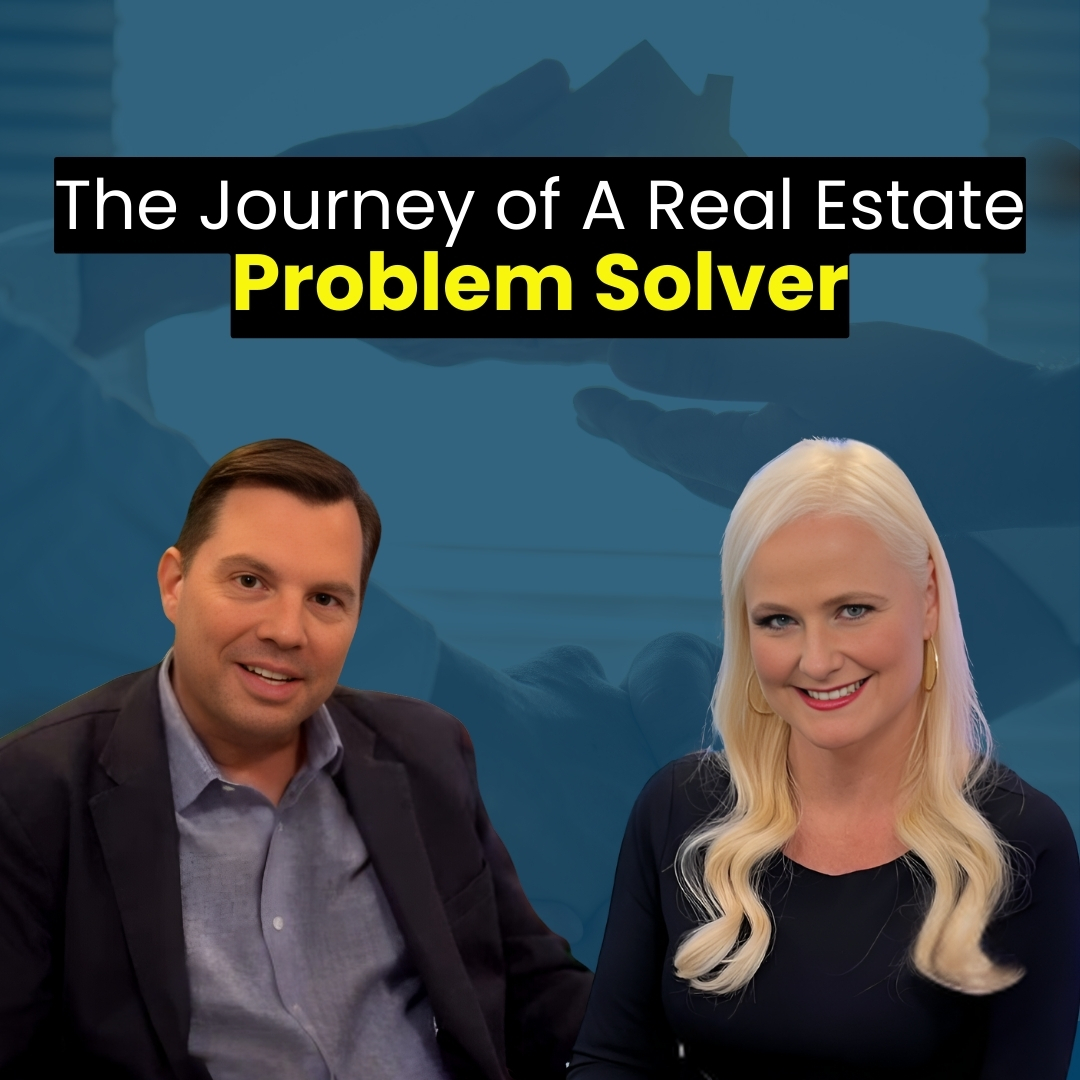Episode Transcript
[00:00:00] Speaker A: Are you a real estate entrepreneur who.
[00:00:01] Speaker B: Just bought a subject to property in.
[00:00:03] Speaker A: Florida and your seller has died or worse, they've gone bankrupt?
I'm Joe Siegel, your real estate asset protection and estate planning attorney here in Florida.
[00:00:27] Speaker B: And, and we handle hundreds of subject.
[00:00:30] Speaker A: To transactions through land trusts every year. And it's very often, unfortunately that the seller who sold you the property, whose name the mortgage is still in, dies.
[00:00:42] Speaker B: Or they go bankrupt.
[00:00:43] Speaker A: But first I want to talk about the bankruptcy. Let's talk about what happens if your seller goes bankrupt.
[00:00:47] Speaker B: If they go bankrupt in the first 90 days after they have sold the property to you and you've taken over.
[00:00:53] Speaker A: Their mortgage payments, they that could be a major problem because any transfer of.
[00:00:57] Speaker B: The property that they did within 90.
[00:01:00] Speaker A: Days prior to filing their bankruptcy is.
[00:01:03] Speaker B: Presumed to be a fraudulent conveyance. And the bankruptcy trustee can pull it.
[00:01:07] Speaker A: Back into their estate and take it back away from you to have it.
[00:01:12] Speaker B: As an asset, unless the property is.
[00:01:14] Speaker A: Not worth what is owed on it.
[00:01:17] Speaker B: And in that case, the bankruptcy trustee.
[00:01:19] Speaker A: Will abandon or surrender that property and let it go. And it's also going to depend on what type of bankruptcy the seller filed, whether they did a chapter 7 or a chapter 13. So you really need to look at those and see exactly what they have filed for you in their bankruptcy. Because if it's a 13, that's going.
[00:01:43] Speaker B: To last a while, it could be.
[00:01:44] Speaker A: More Problematic if it's a 7, those are much faster and easier and they go away pretty quickly. Another issue that you need to look at is if they declared bankruptcy is.
[00:01:56] Speaker B: Are you still paying the mortgage? Because if you're not also paying the.
[00:02:00] Speaker A: Mortgage, you're going to have problems inside the bankruptcy court because they're going to.
[00:02:04] Speaker B: Pull that asset in and go, well, it's not being paid. So we're going to let the creditor go ahead with their foreclosure.
[00:02:10] Speaker A: So of course, if you bought the property subject to the seller's mortgage, you.
[00:02:14] Speaker B: Want to be making the payments so you're not put in that situation. Same thing happens if the seller dies. If the seller dies after they have conveyed the property to you subject to their mortgage and you've just taken over their payments.
[00:02:26] Speaker A: If they die, typically, and we've had this happen dozens of times over the.
[00:02:31] Speaker B: Past 25 years, plus, as long as you are continuing to make the payments.
[00:02:36] Speaker A: On the mortgage, it's fine. The lender, we've never had a lender.
[00:02:41] Speaker B: If they have not exercised their rights.
[00:02:43] Speaker A: To except accelerate and foreclose based on.
[00:02:46] Speaker B: The due on sale Clause violation.
[00:02:48] Speaker A: They are probably not going to accelerate and default and foreclose now that their borrower has died. Nine times out of 10, they never even get notice that their borrower has died unless their seller does a full blown estate probate. And in that case, they may send.
[00:03:08] Speaker B: Notice to that creditor, to that lender to say, hey, they're now dead.
[00:03:12] Speaker A: Just want to let you know, if they owe you money, they can't pay it because they're gone. So in that case, you just have.
[00:03:19] Speaker B: To again, make sure that you're paying.
[00:03:20] Speaker A: And you can keep going. With bankruptcy, you're fortunate because your seller.
[00:03:25] Speaker B: Is still around, they're still alive. So getting access to the lender's information.
[00:03:30] Speaker A: If the servicing changes, if their online.
[00:03:34] Speaker B: Portal changes, anything like that, your seller is still around to help you continue.
[00:03:38] Speaker A: To get access to that.
[00:03:40] Speaker B: And I've spoken before about how important.
[00:03:42] Speaker A: It is to maintain a friendship and maintain a relationship with your seller as.
[00:03:46] Speaker B: Long as that mortgage is open.
[00:03:47] Speaker A: Because you're going to need to be able to access information that their lender has that you are going to need.
[00:03:54] Speaker B: Year after year after year.
[00:03:56] Speaker A: So that's an issue.
[00:03:58] Speaker B: That of course is a major problem.
[00:04:00] Speaker A: If your seller, the lender's borrower dies. Because now you don't have someone who.
[00:04:06] Speaker B: Can call that lender and say, hey.
[00:04:08] Speaker A: I'm the borrower and I have a loan with you and I need a.
[00:04:12] Speaker B: Payoff, I need a reinstatement. I need to know what's going on with the escrow account. Something got screwed up with the taxes, something got screwed up with the insurance. The online access is not working. I need to get access to the online banking for this mortgage account.
[00:04:26] Speaker A: So those become an issue.
[00:04:28] Speaker B: For that reason, there's a few documents.
[00:04:29] Speaker A: That you're always going to want to get the seller to sign at the.
[00:04:34] Speaker B: Closing when they are transferring the property to you subject to their mortgage, a.
[00:04:38] Speaker A: Lot of people just have them sign a deed and that's it.
[00:04:41] Speaker B: At the kitchen table, they get a.
[00:04:42] Speaker A: Deed from the seller to the entrepreneur at clo. At the table, the kitchen table, and they run with it. Now they own the property subject too, however, that's very dangerous because you need a limited power of attorney from that.
[00:04:57] Speaker B: Seller that specifically references the loan, the.
[00:05:00] Speaker A: Mortgage loan, and gives you the authority to speak with the lender at any time to get information on that borrower, that seller's behalf, and you need to.
[00:05:11] Speaker B: Be able to use that.
[00:05:11] Speaker A: Now when your seller dies, technically, legally, that power of attorney dies with them. So you could still have a problem if the lender finds out that they're gone. But at least you have it while they're alive.
[00:05:24] Speaker B: Even if they're in bankruptcy, you can still work with that lender under that limited power of attorney that is specifically.
[00:05:30] Speaker A: Prepared to reference their outstanding loan, the lender's name, and gives you authority to speak with them on your behalf.
[00:05:38] Speaker B: Another thing that another document you're going.
[00:05:40] Speaker A: To definitely want to have is a solvency affidavit that your seller signs saying.
[00:05:48] Speaker B: They are not bankrupt, they have enough money to pay their bills, their assets.
[00:05:53] Speaker A: Outstrip their debts, so they are not.
[00:05:56] Speaker B: Bankrupt, they are not insolvent at the.
[00:05:59] Speaker A: Time that they are transferring this property to you. That way, should they declare bankruptcy after they have conveyed the property to you.
[00:06:08] Speaker B: At least you have that in your.
[00:06:09] Speaker A: Back pocket and you can show it.
[00:06:11] Speaker B: To the bankruptcy trustee, the bankruptcy judge.
[00:06:14] Speaker A: To say, hey, they told me they were solvent under penalties of perjury in.
[00:06:18] Speaker B: An affidavit in front of a notary public.
[00:06:21] Speaker A: So I had every right to assume that they were solvent.
[00:06:25] Speaker B: So I did not participate in any.
[00:06:27] Speaker A: Kind of fraudulent conveyance.
[00:06:29] Speaker B: And we would like to continue making.
[00:06:31] Speaker A: The payments on the loan and just keep it. And if it's a chapter seven, the court's probably just going to enter the general discharge that says that the debtor is no longer personally liable for that debt.
[00:06:44] Speaker B: You are continuing to pay the mortgage.
[00:06:46] Speaker A: So the mortgagee, the lender, is not going to step in and default them.
[00:06:51] Speaker B: At that point and try to foreclose. In most cases we've never had it.
[00:06:54] Speaker A: Happen, so you're probably going to be okay if they've died. The solvency affidavit is not that important, but it is nice to have it around again just in case there is.
[00:07:06] Speaker B: A chance that they may go bankrupt.
[00:07:08] Speaker A: During the life of the loan. We've had people who buy subject to.
[00:07:12] Speaker B: The mortgage and they hold it for a matter of weeks or months and then they fix it up, they flip it, they sell it and they pay off the mortgage.
[00:07:18] Speaker A: We've had other people who have bought the property subject to the mortgage and they've held it for years. They've rented it, they've sold it on a lease option, they've sold it on an agreement for deed or, or they've sold the beneficial interest in the trust on a conditional assignment of beneficial interest. There's lots and lots of ways that exit strategy occurs and there are lots of timelines that takes from a matter.
[00:07:40] Speaker B: Of weeks to a matter of years.
[00:07:41] Speaker A: Before that mortgage is finally paid off and goes away. And then you don't have to worry so much about whether your seller, the original borrower, is alive and bankrupt or if they're dead. So those are some considerations to take into account. Anytime you buy a property subject to a mortgage, you always have a chance that your borrower seller is going to go bankrupt or they're going to die during the life of the loan while.
[00:08:11] Speaker B: You are holding the property.
[00:08:12] Speaker A: There are dangers out there if that should happen, there are risks that you.
[00:08:15] Speaker B: Are undertaking, should that happen.
[00:08:17] Speaker A: So to alleviate those risks, to reduce them as much as possible, solvency affidavit.
[00:08:23] Speaker B: Is absolutely necessary, a limited power of attorney is absolutely necessary.
[00:08:26] Speaker A: And then of course you're going to want to have a document signed by the seller that gives you the password, the username and states that they will continue to provide access to you and cooperate with you to have access to the online portal. No matter where that may move to.
[00:08:44] Speaker B: Over the years, they will cooperate with.
[00:08:46] Speaker A: You to ensure that you always have access to that mortgage servicing portal.
[00:08:52] Speaker B: So you can log in, you can make payments, you can get payoff information.
[00:08:55] Speaker A: You can pull the interest statements for tax purposes, you can do everything you need to with that mortgage on their behalf as long as you own the house subject to that mortgage.
[00:09:06] Speaker B: So hope that helps.
[00:09:07] Speaker A: If you ever had the need to.
[00:09:09] Speaker B: Buy a property subject to again, we.
[00:09:11] Speaker A: Handle hundreds of them a year. For clients, typically it is handled through.
[00:09:15] Speaker B: The land trust that we are the.
[00:09:17] Speaker A: Trustee of with a conditional assignment of the beneficial interest from the seller to.
[00:09:22] Speaker B: The end buyer, the real estate entrepreneur.
[00:09:25] Speaker A: Investor, however you want to put that and that is we are in the middle. And as long as you continue making your payments, you're in control of the trust. If you default over a certain amount of time, it can revert to the original seller, the original borrower, and they.
[00:09:41] Speaker B: Can take the property back.
[00:09:43] Speaker A: So it is a consumer protection feature built into the subject to transaction that we help provide as a way of getting the sellers comfortable with the subject to transaction.
[00:09:55] Speaker B: Rather than just signing their their property.
[00:09:57] Speaker A: Over at the kitchen table and your their credit rating going to an a person that they have only met for a matter of hours or days now.
[00:10:07] Speaker B: Is taking over the home.
[00:10:09] Speaker A: They now own the home and whether.
[00:10:10] Speaker B: They'Re going to pay or not and.
[00:10:12] Speaker A: Destroy the seller's credit, who knows.
[00:10:14] Speaker B: But at least this helps that seller feel a little more comfortable to know that well, no title is actually going.
[00:10:20] Speaker A: Into an independent third party trustee who will simply hold the title. And if the buyer, the real estate.
[00:10:28] Speaker B: Entrepreneur defaults in payment payment of the.
[00:10:31] Speaker A: Mortgage, they may die, they may go bankrupt. In that case, the original seller borrower.
[00:10:38] Speaker B: Under the loan can take back the.
[00:10:40] Speaker A: Interest in the trust and own it and move forward and resell the house, or at least collect the rents from the tenant and make the mortgage payments and everything else they need to do to protect their credit rating as much as possible. So again, if you ever need anything about that, feel free to reach out and ask us questions. We'll have contact information down in the show notes. And until then, Trust this.
[00:11:02] Speaker C: Thanks for listening to this edition of Trust this. If you got something out of it, please press like and subscribe and give us a five star review to help us reach others who can benefit from this series. Until next time, keep aspiring to a better life.


